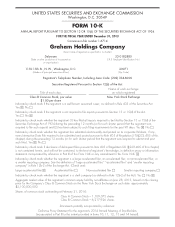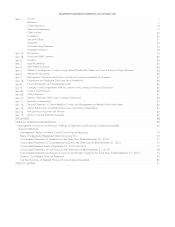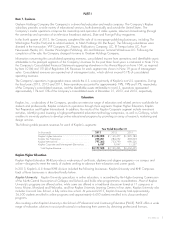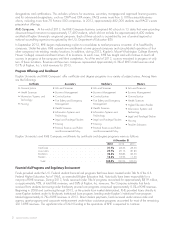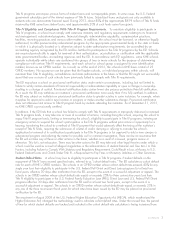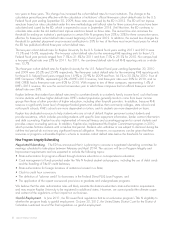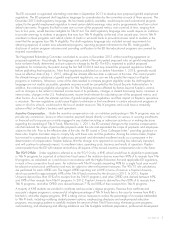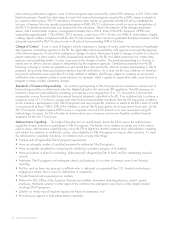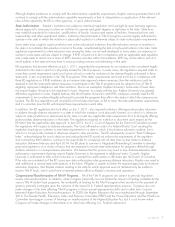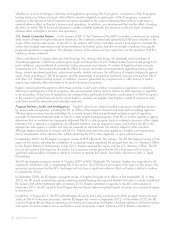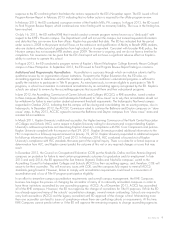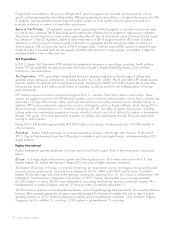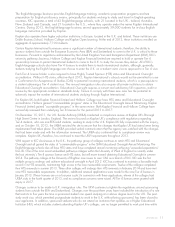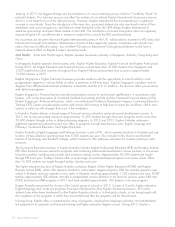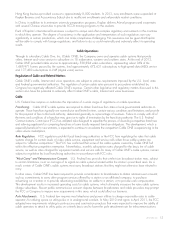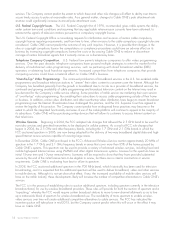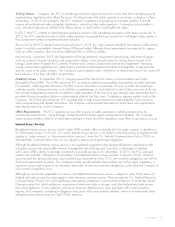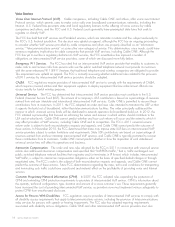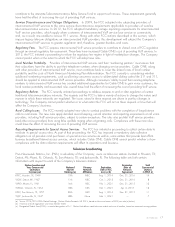Washington Post 2013 Annual Report Download - page 25
Download and view the complete annual report
Please find page 25 of the 2013 Washington Post annual report below. You can navigate through the pages in the report by either clicking on the pages listed below, or by using the keyword search tool below to find specific information within the annual report.Although Kaplan endeavors to comply with the administrative capability requirements, Kaplan cannot guarantee that it will
continue to comply with the administrative capability requirements or that its interpretation or application of the relevant
rules will be upheld by the ED or other agencies, or upon judicial review.
State Authorization. Kaplan’s institutions are subject to state-level regulation and oversight by state licensing agencies,
whose approval is necessary to allow an institution to operate and grant degrees or diplomas in the state. State laws
may establish standards for instruction, qualifications of faculty, location and nature of facilities, financial policies and
responsibility and other operational matters. Institutions that participate in Title IV programs must be legally authorized to
operate in the state in which the institution is physically located or is otherwise subject to state authorization requirements.
Some states have sought to assert jurisdiction over online educational institutions that offer education services to residents in
the state or to institutions that advertise or recruit in the state, notwithstanding the lack of a physical location in the state. State
regulatory requirements for online education vary among the states, are not well developed in many states, are imprecise or
unclear in some states and are subject to change. If KHE is found not to be in compliance with an applicable state regulation
and a state seeks to restrict one or more of KHE’s business activities within its boundaries, KHE may not be able to recruit or
enroll students in that state and may have to cease providing services and advertising in that state.
ED regulations that became effective on July 1, 2011, expanded the requirements for an institution to be considered legally
authorized in the state in which it is physically located for Title IV purposes. In some cases, the regulations required states to
revise their current requirements and/or to license schools in order for institutions to be deemed legally authorized in those
states and, in turn, to participate in the Title IV programs. If the states’ requirements are found not to be in compliance with
these ED regulations or if KHE institutions do not receive state approvals where necessary, then the institutions could be
deemed to lack the state authorization necessary to participate in the Title IV programs and be subject to loss of Title IV
eligibility, repayment obligations and other sanctions. Due to an exemption, Kaplan University’s home state of Iowa does
not require Kaplan University to be registered in Iowa. However, to comply with the law, Kaplan University was granted
affirmative registration in Iowa. Kaplan believes that all of Kaplan University’s and KHE’s campuses currently meet the ED
requirements to be considered legally authorized to provide the programs they offer in the states in which the campuses are
located. The ED has stated that it will not publish a list of states that meet, or fail to meet, the state authorization requirements,
and it is uncertain how the ED will interpret these requirements in each state.
In addition, the ED regulations that took effect on July 1, 2011, also required institutions offering postsecondary education
to students through distance education in a state in which the institution is not physically located, or in which it is otherwise
subject to state jurisdiction as determined by the state, to meet any applicable state requirements for it to be legally offering
postsecondary distance-education in that state. The regulations required an institution to document upon request by the
ED that it had the applicable state approval. In June 2012, the U.S. Court of Appeals for the District of Columbia vacated
the regulations with respect to distance education. The Court affirmed an order of a Federal District Court vacating the
regulation requiring an institution to meet state requirements in a state in which it has distance education students, but in
which it is not physically located or otherwise subject to state jurisdiction. The ED subsequently issued a “Dear Colleague
Letter,” acknowledging the court’s decision and stating that the ED would not enforce the requirements of the regulation
and commenting that institutions continue to be responsible for complying with all state laws as they relate to distance
education. Between February and April 2014, the ED plans to convene a Negotiated Rulemaking Committee to develop
proposed regulations on a variety of topics that are expected to include state authorization for programs offered through
distance education or correspondence education. We believe that this process may result in new distance-education state
authorization requirements that may require Kaplan University to be registered in additional states. Currently, Kaplan
University is authorized to offer online instruction or is exempt from authorization in 48 states plus the District of Columbia.
If the rules are reinstated or if the ED issues new state authorization rules governing distance education, Kaplan may need to
seek additional or revised state authorizations in the future. If Kaplan is unable to obtain the required approvals for distance-
education programs, then Kaplan students residing in the state for which approval was not obtained may be unable to
receive Title IV funds, which could have a material adverse effect on Kaplan’s business and operations.
Congressional Reauthorization of Title IV Programs. All of the Title IV programs are subject to periodic legislative
review and reauthorization. In addition, while Congress historically has not limited the amount of funding available for the
various Title IV student loan programs, the availability of funding for the Title IV programs that provide for the payment of
grants is primarily contingent upon the outcome of the annual U.S. Federal appropriations process. Congress also can
make changes in the laws affecting Title IV programs in those annual appropriations bills and in other laws it enacts
between Higher Education Act reauthorizations. In 2008, the Higher Education Act was reauthorized through September
2014. The Senate Health, Education, Labor and Pensions Committee (HELP) and the House Education and the Workforce
Committee have begun a series of hearings on reauthorization of the Higher Education Act, but it is not known when
Congress will make changes to that statute or to other laws affecting U.S. Federal student aid.
2013 FORM 10-K 7


